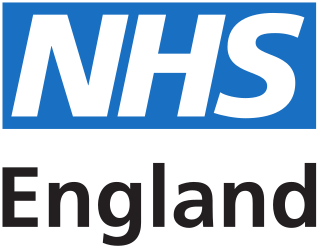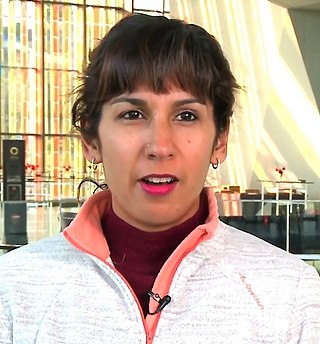
The Department of Health and Social Care (DHSC) is a department of His Majesty's Government responsible for government policy on health and adult social care matters in England, along with a few elements of the same matters which are not otherwise devolved to the Scottish Government, Welsh Government or Northern Ireland Executive. It oversees the English National Health Service (NHS). The department is led by the Secretary of State for Health and Social Care with three ministers of state and three parliamentary under-secretaries of state.

The National Institute for Health and Care Excellence (NICE) is an executive non-departmental public body, in England, of the Department of Health and Social Care, that publishes guidelines in four areas:

The British Computer Society (BCS), branded BCS, The Chartered Institute for IT, since 2009, is a professional body and a learned society that represents those working in information technology (IT), computing, software engineering and computer science, both in the United Kingdom and internationally. Founded in 1957, BCS has played an important role in educating and nurturing IT professionals, computer scientists, software engineers, computer engineers, upholding the profession, accrediting chartered IT professional status, and creating a global community active in promoting and furthering the field and practice of computing.
Informing Healthcare was set up by the Welsh Assembly Government in December 2003, to improve healthcare services for people in Wales by introducing modern ways of sharing and using information. It is one of the key enablers for 'Designed For Life'; the national ten year strategy to deliver better health and social care for Wales.

NHS Digital is the trading name of the Health and Social Care Information Centre, which is the national provider of information, data and IT systems for commissioners, analysts and clinicians in health and social care in England, particularly those involved with the National Health Service of England. The organisation is an executive non-departmental public body of the Department of Health and Social Care.

NHS National Services Scotland (NSS) is a Non Departmental Public Body which provides advice and services to the rest of NHS Scotland.

NHS Scotland, sometimes styled NHSScotland, is the publicly funded healthcare system in Scotland and one of the four systems that make up the National Health Service in the United Kingdom. It operates 14 territorial NHS boards across Scotland, supported by seven special non-geographic health boards, and Public Health Scotland.

NHS Education for Scotland (NES) is an education and training body and a national (special) health board within NHS Scotland.
The NHS Connecting for Health (CFH) agency was part of the UK Department of Health and was formed on 1 April 2005, having replaced the former NHS Information Authority. It was part of the Department of Health Informatics Directorate, with the role to maintain and develop the NHS national IT infrastructure. It adopted the responsibility of delivering the NHS National Programme for IT (NPfIT), an initiative by the Department of Health to move the National Health Service (NHS) in England towards a single, centrally-mandated electronic care record for patients and to connect 30,000 general practitioners to 300 hospitals, providing secure and audited access to these records by authorised health professionals.
NHS numbers are the unique numbers allocated in a shared numbering scheme to registered users of the three public health services in England, Wales and the Isle of Man. It is the key to the identification of patients, especially in delivering safe care across provider organisations, and is required in all new software deployed within these National Health Services (NHS).

The National Health Service (NHS) is the publicly funded healthcare system in England, and one of the four National Health Service systems in the United Kingdom. It is the second largest single-payer healthcare system in the world after the Brazilian Sistema Único de Saúde. Primarily funded by the government from general taxation, and overseen by the Department of Health and Social Care, the NHS provides healthcare to all legal English residents and residents from other regions of the UK, with most services free at the point of use for most people. The NHS also conducts research through the National Institute for Health and Care Research (NIHR).
SystmOne is a centrally hosted clinical computer system developed by Horsforth-based The Phoenix Partnership (TPP). It is used by healthcare professionals in the UK predominantly in primary care. The system is being deployed as one of the accredited systems in the government's programme of modernising IT in the NHS.
OPCS-4, or more formally OPCS Classification of Interventions and Procedures version 4, is the procedural classification used by clinical coders within National Health Service (NHS) hospitals of NHS England, NHS Scotland, NHS Wales and Health and Social Care in Northern Ireland. It is based on the earlier Office of Population Censuses and Surveys Classification of Surgical Operations and Procedures, and retains the OPCS abbreviation from this now defunct publication.

Public Health England (PHE) was an executive agency of the Department of Health and Social Care in England which began operating on 1 April 2013 to protect and improve health and wellbeing and reduce health inequalities. Its formation came as a result of the reorganisation of the National Health Service (NHS) in England outlined in the Health and Social Care Act 2012. It took on the role of the Health Protection Agency, the National Treatment Agency for Substance Misuse and a number of other health bodies. It was an executive agency of the Department of Health and Social Care, and a distinct delivery organisation with operational autonomy.
Health Education England (HEE) is an executive non-departmental public body of the Department of Health and Social Care. Its function is to provide national leadership and coordination for the education and training within the health and public health workforce within England. It has been operational since June 2012.

NHS England, officially the NHS Commissioning Board, is an executive non-departmental public body of the Department of Health and Social Care. It oversees the budget, planning, delivery and day-to-day operation of the commissioning side of the National Health Service in England as set out in the Health and Social Care Act 2012. It directly commissions NHS general practitioners, dentists, optometrists and some specialist services. The Secretary of State publishes annually a document known as the NHS mandate which specifies the objectives which the Board should seek to achieve. National Health Service Regulations are published each year to give legal force to the mandate.
The General Practice Extraction Service was a British health service outcomes research computer database that collates statistical aggregated data from individual medical records of GPs in England, for purposes independent of an individual's immediate health, such as public health research. It may conflict with sensitive medical confidentiality. It is similar to bioinformatics, epidemiology, and a health information exchange.
The Health and Social Care Network (HSCN) is a standards-based network that replaced the N3 network in the National Health Service (NHS) in England. It went live in April 2017. Transition to the new network was completed by November 2020.
NHSX was a United Kingdom Government unit from early 2019 to early 2022, with responsibility for setting national policy and developing best practice for National Health Service (NHS) technology, digital and data, including data sharing and transparency.

Indra Joshi is a British physician who is Director of Artificial Intelligence for NHSX and a founding ambassador of One HealthTech. She supports NHSx with digital health initiatives in the National Health Service in England. During the COVID-19 pandemic Joshi was appointed to the Scientific Advisory Group for Emergencies (SAGE).










